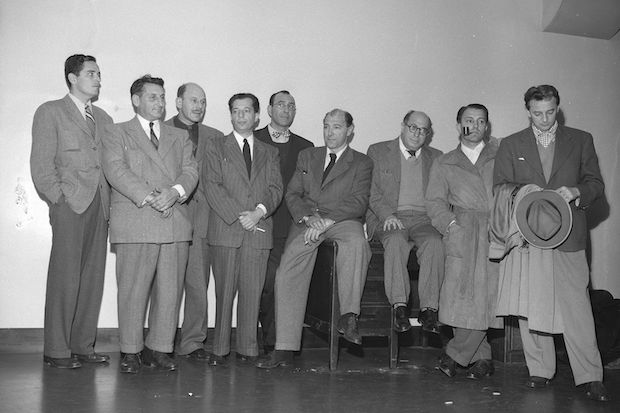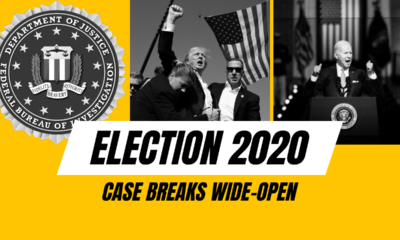Entertainment Today
Blacklist then and now
The Hollywood blacklist, which began seventy-five years ago, is back–and those who protest the original blacklist, are running this one.
Seventy-five years ago this month, ten men refused to testify to a committee of Congress about Communist infiltration of Hollywood. A court convicted all ten of contempt of Congress and sentenced them to a year in federal prison. But their real sentence came after their release, when no one in Hollywood would hire them. This Hollywood Blacklist lasted until 1960. But what no one, looking back on the original Blacklist today, wants to admit is that the Blacklist is back. And adherents to the basic principle of communism have brought it back.
How the Blacklist began
Historical sources for this discussion include:
- An interview with Prof. Tom Doherty at Brandeis University in 2018,
- A description of a collection of newspaper clippings at the Southern California Library for Social Studies and Research, and
- Interviews that Ben Mankiewicz, nephew of the celebrated director Joseph R. Mankiewicz, has conducted lately with researchers of the period, including some who say they knew some of the principals involved. Mr. Mankiewicz has conducted these interviews as part of hosting of motion pictures of the period for Turner Classic Movies.
The roots of the Blacklist go back further than October of 1947, to the formation of the relevant committee. The House Standing Committee on Un-American Activities, abbreviated HUAC, formed in 1938. That Committee had a very wide brief, covering suspected domestic spying and/or subversion on behalf of any foreign power. The two main powers upon whom the Committee directed its focus were:
- The Union of Soviet Socialist Republics, and
- Germany under the rule of the Nationalist Socialist German Workers’ Party – the Nazis.
As such this Committee focused on the Communist Party in the USA and the German-American Bund. During the Second World War, the Bund remained the focus. After all, Adolf Hitler declared war against the United States, while Josef Stalin sought a de facto alliance with America. But after the War, the Committee focused entirely on the CP-USA, after Sir Winston Churchill coined the phrase “Iron Curtain” in his speech at Westminster College, Fulton, Missouri.
The Hollywood Ten
The Committee summoned Hollywood writers, directors, and producers to testify as to who among them had ever joined the CP-USA or expressed Communist thought. (Senator Joseph McCarthy, R-Wisc., would famously ask after Communist Party membership in his committee – but this came three years later.) Ten witnesses flatly refused to name any names:
- Producer/director Herbert Biberman,
- Director Edward Dmytryk,
- Producer/writer Robert Adrian Scott, and
- Screenwriters Alvah Bessie, Lester Cole, Ring Lardner, Jr., John Howard Lawson, Albert Maltz, Samuel Ornitz, and Dalton Trumbo.

These “Hollywood Ten” could have stood on the Fifth Amendment, which says in relevant part:
No person shall be … compelled to be a witness against himself.
Instead they stood on the First Amendment. They held that neither they nor any of their colleagues could possibly be subject to prosecution merely for advocating Communism. Perhaps because they made that choice, they stood trial for contempt of Congress. They received sentences of a year in prison and paid fines of a thousand dollars each. (This would be equivalent to twenty thousand dollars today, based on the evolution of discount stores from “five and ten” to “dollar store.”) More to the point, the chiefs of the Hollywood studios wanted no part of Communism or any advocacy of same. Hence the Blacklist.
Of the ten, Edward Dmytryk would “break” and “name names” to resume his career.
A tale of two witnesses
Two different witnesses (other than the Hollywood Ten) provided the most striking contrast of the period. One, Carl Foreman, objected strenuously to the Blacklist and what it represented. He made his most famous project, High Noon, as an allegory of the period. In it he sought to show that heroism includes standing one’s ground even in the face of desertion. Thus Frank Miller and his gang of thieves and cutthroats represent the House Un-American Activities Committee. The cowardly townspeople, who refuse to join Will Kane in forming a posse comitatus, represent Hollywood executives.
The other, Elia Kazan, did name names, and was proud of it. He saw Communism as a real danger, and suggested that some friends do deserve “ratting out,” if they are engaging in dangerous activity. His lead character in On the Waterfront, Terry Malloy, represents Kazan himself. The corrupt union boss, who begins by throwing someone off a roof, represents perhaps not so much the Communist Party as the power everyone assumed was behind it. That power would be the First Chief Directorate of the Committee for State Security (Komitet Gosudarstvennoye Bezopasnosti, KGB). And in fact, your editor has in his library a volume, called Annals of Communism, containing facsimiles of KGB archival documents, some of which clearly refer to a conspiratorial apparatus (konspirativni apparat) operating in the United States at the time.
Hollywood lionizes Carl Foreman as a hero. Upon Elia Kazan they pour undisguised contempt to this day.
Impressions of how Hollywood today represents the Blacklist
CNAV finds Hollywood’s attitude toward the Blacklist disgustingly hypocritical. First, in remembering the Hollywood Ten (and nine other “unfriendly witnesses,” including Carl Foreman), historians like Tom Doherty and Ben Mankiewicz admit that they each did join the Communist Party. They deny that any of the Ten (or the other nine) ever tried to overthrow the United States government. Well, somebody did! The Annals of Communism prove it. Whether that included the Ten is an open question. In fact, Ayn Rand, who also testified before the Committee, later castigated them for attacking the wrong target. Instead of hunting evil men, one must fight an evil idea – with a good idea.
But do men like Mankiewicz or Doherty express that particular misgiving? No! Instead they side with the ideology. Ben Mankiewicz openly says, “Capitalism failed us in the 1930s.” Never mind that Herbert Hoover’s departure from capitalism, not capitalism per se, started the Depression.
Furthermore, these commentators would have people believe that Communism never had any victims. Not only that, but those same people say that capitalism does make victims. In fact they all seem to have bought into Antonio Gramsci’s original Critical Theory. Which essentially holds that anyone trying to reserve anything for himself, is an Enemy Of The People. In short, those of us who believe in life, liberty, and property, are no better than Frank Miller. And the hapless roof-push victim at the beginning of On the Waterfront, deserved to die.
They’re bringing it back
As if that isn’t bad enough, many of those people have brought the Blacklist back. Instead of a House Un-American Activities Committee, we have the House Select Committee to Investigate the January 6 Attacks. Which, as CNAV has said before, exists to write bills of attainder and an ex post facto law, using as their excuse an event that everyone who cares to know, recognizes as a false-flag pseudo-operation.
Beyond that, those who claim to stand on the First Amendment as it applies to the Hollywood Ten, want to repeal the First Amendment today. Man like Jack Dorsey and Parag Agrawal at Twitter, for example, stand in for those Hollywood executives. And now the federal government is seeking to stop Elon Musk from acquiring Twitter. Why? Because he will end Twitter’s participation in the modern Blacklist.
The reversal of attitudes toward something called Russia is another booby-prize example of hypocrisy. Back when Russia called itself Union of Soviet Socialist Republics, Russia had Hollywood’s sympathy. (Indeed, Albert R. “Cubby” Broccoli, head of Everything Or Nothing Productions, who held the movie rights to a character named James Bond, conceived of Bond fighting a transnational corporation and not the KGB.) But now Russia has abandoned Communism. Worse, its “strong man” encourages his people to arm themselves, and to reject certain decadent, and debilitating, Western cultural elements. Suddenly his country is an enemy of civilization, and now people fear its influence on the American government!
To sum up
Those who presume to criticize the original Blacklist, have no more moral authority. They forfeited that when they started to bring it back. Today we call it cancel culture. This New Blacklist now forces patriotic Americans to build their own institutions parallel to, and independent of, those which the New Blacklist operators now control.
Tellingly, Hollywood is losing money. But they don’t seem to care. They would rather become the Department of Information for a new polity that will abandon the United States Constitution. Any money they lose, is the price of the Communist revolution.
So CNAV will accord them no respect, for they deserve none. Their real criticism of the Blacklist is that their enemies ran it. Now that their friends are running it, they celebrate it and egg it on. How history will remember them, only time will tell.
Terry A. Hurlbut has been a student of politics, philosophy, and science for more than 35 years. He is a graduate of Yale College and has served as a physician-level laboratory administrator in a 250-bed community hospital. He also is a serious student of the Bible, is conversant in its two primary original languages, and has followed the creation-science movement closely since 1993.
-

 Accountability2 days ago
Accountability2 days agoWaste of the Day: Principal Bought Lobster with School Funds
-

 Constitution2 days ago
Constitution2 days agoTrump, Canada, and the Constitutional Problem Beneath the Bridge
-

 Executive24 hours ago
Executive24 hours agoHow Relaxed COVID-Era Rules Fueled Minnesota’s Biggest Scam
-

 Civilization23 hours ago
Civilization23 hours agoThe End of Purple States and Competitive Districts
-

 Civilization5 days ago
Civilization5 days agoThe devil is in the details
-

 Executive4 days ago
Executive4 days agoTwo New Books Bash Covid Failures
-

 Civilization4 days ago
Civilization4 days agoThe Conundrum of President Donald J. Trump
-

 Executive4 days ago
Executive4 days agoThe Israeli Lesson Democrats Ignore at Their Peril














